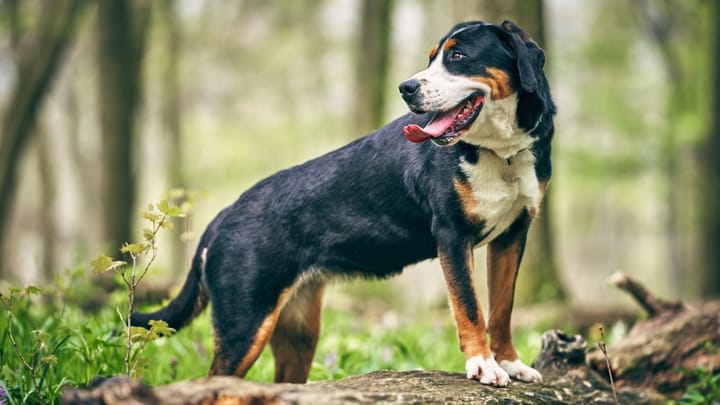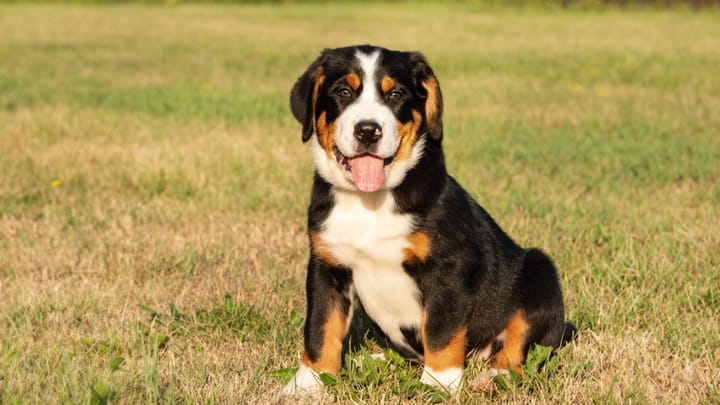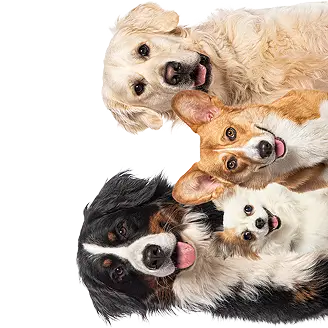Great Swiss Mountain Dog
Other names : Grosser Schweizer Sennenhund, Great Swiss Cattle Dog


The Greater Swiss Mountain dog is a large, strong, and handsome breed with a distinct tricolour coat. Despite its bulky frame, the Swiss Mountain dog is an agile and athletic breed. Given they were developed near mountain ranges, these dogs are not suited to the inner-city life; they need plenty of wide open space to fully express themselves. Personality wise, they're enthusiastic, highly energetic, and love making human friends. In fact, these dogs crave human affection and contact. The Greater Swiss also makes a great family pet. They're extremely loyal to their owners and are gentle and loving around small children.
|
Life expectancy |
The Great Swiss Mountain Dog has a life expectancy of between 9 and 11 years |
|
Temperament |
|
|
Size |
Large
|
|
Adult size |
Female
Between 24 and 27 in
Male
Between 26 and 28 in
|
|
Adult weight |
Female
Between 66 and 77 lb
Male
Between 77 and 88 lb
|
|
Coat colour
Tri-coloured. Silky black across the top of the head, back and hind. A large white blaze on the chest and a small white patch around the nose. Brown and reddish markings on legs, face, and chest. |
Black White Red |
|
Type of coat
Short, dense undercoat. Medium length topcoat. Double coated. |
Short Long |
|
Eye colour
Dark brown or a light hazel colour. |
Brown
|
|
Purchase price |
The Great Swiss Mountain Dog costs between £860 and £1280 |
The Greater Swiss Mountain dog is quite a rare breed in the UK. Any potential owners will need to contact a specialist breeder.
No dogs like being tied up, but these dogs really hate it. There also not suited for long walks on the leash as they have a natural desire to run free.
These dogs can take quite a while to mature, both physically and mentally. Don’t over-exercise them as puppies as it can damage their joint and bones. They can also display “puppyish” behaviour well into their adolescence.
More details about the Great Swiss Mountain Dog
Great Swiss Mountain Dog: Origins and history
There are conflicting theories as to this dogs origins. Some experts believe they descended from dogs brought across Europe by the ancient Romans, while others argue that they're directly related to the wolf/dogs of the Neolithic period. Either way, the modern Swiss Mountain Dogs were developed in and around Switzerland. Although prized for their herding abilities, these dogs are so strong that they were often used to pull carts and milk wagons. Their popularity is steadily growing among domestic dog lovers, but the Swiss Mountain Dog is still more of a working animal than a household pet.
Physical characteristics of the Great Swiss Mountain Dog
The Greater Swiss is a tri-coloured, big boned and sturdy animal. An incredibly strong dog that is much quicker than it looks, the Swiss has a large, broad skull, a deep chest, and well-balanced hindquarters. They have medium-sized, almond-shaped eyes and smallish ears that hang halfway down their heads. There is a noticeable difference between the sexes, with the males being much larger.
FCI classification of the Great Swiss Mountain Dog
-
Group 2 - Pinscher and Schnauzer - Molossoid and Swiss Mountain and Cattledogs
-
Section 2 : Molossian type
Great Swiss Mountain Dog: Characteristics
Great Swiss Mountain Dog: Behaviour
Training a Great Swiss Mountain Dog
For an active and highly intelligent breed, the Greater Swiss Mountain dog is relatively easy to train. They'll still provide some unique challenges as they can be quite difficult to housetrain, especially during the first six months. However, with a bit of patience and commitment, even a novice dog owner can learn how to handle a swiss.
Great Swiss Mountain Dog: Lifestyle
Breed compatibility Great Swiss Mountain Dog
Great Swiss Mountain Dog: Purchase price
A purebred Greater Swiss Mountain puppy will cost between £860 - £1,280.
They can be quite hard to find, especially in the UK, meaning you may have to pay much more. You’ll need to budget around £70 a month per food and the average insurance policy will cost another £60-100 every month.
Great Swiss Mountain Dog: Shedding
Average
The Swiss Mountain Breed is not prone to hair loss.
Great Swiss Mountain Dog: Grooming
Their medium length coats require no more than a weekly brush. But they do shed heavily during spring.
Great Swiss Mountain Dog: Health
The average lifespan for the Swiss Mountain dog is between 9-11 years.
The Swiss Mountain dog is not the biggest of the big dogs, but they’re certainly one of the strongest. Their naturally muscular bodies means they’re tough, robust, and capable of looking after themselves.
These dogs were not made for the heat, although they do shed a lot as the temperatures start to rise. The average British summer won’t bother them too much, but keep them inside the shade during our rare periods of hot weather.
These herding dogs deal with the cold extremely well. In fact, it’s what they were designed for. They have thick, double layered coats that keep in the warm, while the outer coat protects them from wind and rain.
They’re not prone to obesity or weight gain. But it’s still important to restrict their food intake. Obesity can put even more strain on a big dogs joints, leading to painful medical conditions like osteoarthritis.
- Urinary incontinence
- Hip Dysplasia
- Cataracts
- Epilepsy
- Arthritis
- Glaucoma
- Gastric dilatation volvulus
Do you want a Great Swiss Mountain Dog dog ?
Oh no...
There are no Great Swiss Mountain Dog adoption profiles at the moment...







